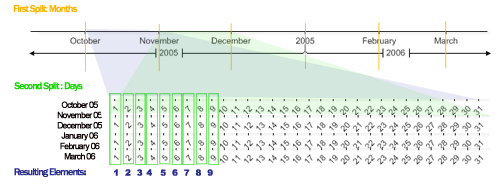Splits the elements based on the first split, then the resulting series are grouped based on the second split. A simple analogy is a stretch of measuring tape representing a timeline. The tape is cut into sections based on (first split), then the pieces are stacked on top of each other and cut again based on the second split. The resulting stacks are evaluated down to an element based on the specified calculation.
As a real world example, consider you have a series with web site traffic represented by an element for each time the website was visited including a date and time. This method can parse the data in a way that allows determining the traffic for each day of the week throughout the entire span of time. This means all the traffic going through the website on any monday would be calculated down to a single element, same for tuesday and so on.
This illustration shows how the data is arranged.

| Overload | Description |
|---|---|
| SplitRegroup | Splits the elements based on the first split, then the resulting series are grouped based on the second split. A simple analogy is a stretch of measuring tape representing a timeline. The tape is cut into sections based on (first split), then the pieces are stacked on top of each other and cut again based on the second split. The resulting stacks are evaluated down to an element based on the specified calculation. As a real world example, consider you have a series with web site traffic represented by an element for each time the website was visited including a date and time. This method can parse the data in a way that allows determining the traffic for each day of the week throughout the entire span of time. This means all the traffic going through the website on any monday would be calculated down to a single element, same for tuesday and so on. This illustration shows how the data is arranged.
|
Target Platforms: Windows 7, Windows Vista SP1 or later, Windows XP SP3, Windows Server 2008 (Server Core not supported), Windows Server 2008 R2 (Server Core supported with SP1 or later), Windows Server 2003 SP2